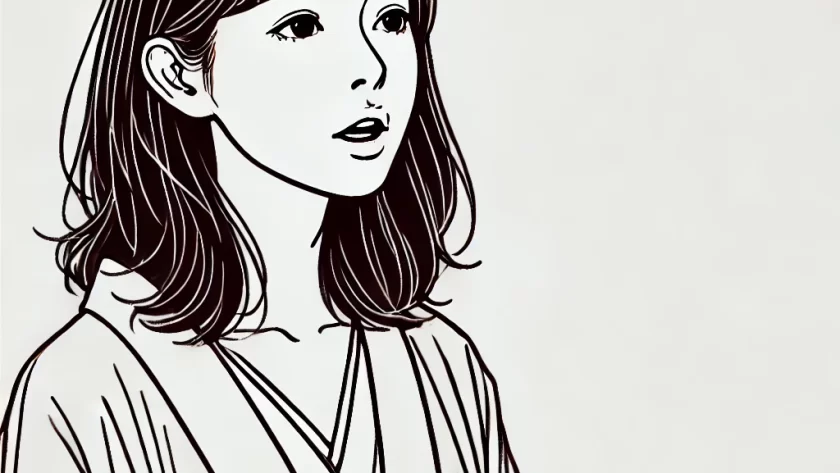すずめ [Suzume]
RADWIMPS feat. 十明 [Raddowinpusu feat. Toaka]
Words & Music : 野田洋次郎 [NODA Yōjirō]
“Suzume” is a song created for Makoto Shinkai’s animated film Suzume no Tojimari (English title: Suzume). It was composed by NODA Yōjirō of Radwimps, who is a favorite band of Shinkai. However, this track isn’t performed by the rock band Radwimps, but rather written and composed by NODA Yōjirō, and it can be said that it was selected for the female singer Toaka.
The song’s title is Suzume, which differs from the Japanese film title. “Suzume” means a sparrow, but in this film, it’s the protagonist’s name (IWATO Suzume). The name originates from a goddess in Japanese mythology called Ame-no Uzume. She appears in the legend of Ama no Iwato wiki, where the sun deity hides behind a rock door. However, to be honest, I’m not quite sure why this title was chosen. Moreover, the words in the lyrics don’t have much connection to the elements seen in the movie. I actually watched the film just to write this article…
The song is truly beautiful. Most of the words used in the lyrics are Wago, giving them a soft and elegant sound. Wago are the original words of the Japanese language. Given that Shinto is a significant element in the film, it makes sense that more traditional Japanese words were chosen.
君の中にある 赤と青き線
kimi no naka ni aru aka to aoki sen
それらが結ばれるのは 心の臓
sorera ga musubareru no wa kokoro no zō
- 君(きみ) [kimi] : you
- 中(なか) [naka] : inside
- 赤(あか) [aka] : red
- 青い(あおい) [aoi] : blue
- 線(せん) [sen] : line
- 結ぶ(むすぶ) [musubu] : tie, connect
- 心臓(しんぞう) [shinzō] : heart, (contextually) soul
(translation) “The red and blue lines within you,
They are connected to the heart.”
風の中でも負けないような声で
kaze no naka demo makenai yō na koe de
届ける言葉を今は育ててる
todokeru kotoba o ima wa sodateteru
- 風(かぜ) [kaze] : wind
- 中(なか) [naka] : inside
- 負ける(まける) [makeru] : lose
- 声(こえ) [koe] : voice
- 届ける(とどける) [todokeru] : deliver
- 言葉(ことば) [kotoba] : words
- 今(いま) [ima] : now
- 育てる(そだてる) [sodateru] : nurture
(translation) “In a voice that won’t be defeated by the wind,
I am now nurturing the words I will deliver.”
時はまくらぎ 風はにきはだ 星はうぶすな 人はかげろう
toki wa makuragi kaze wa nikihada hoshi wa ubusuna hito wa kagerō
- 時(とき) [toki] : time
- 風(かぜ) [kaze] : wind
- 星(ほし) [hoshi] : star
- 人(ひと) [hito] : person
(translation) “Time is the pillow wood, wind is soft skin, stars are birthplace, and people are mirages.”
Words like “nikihada” (=soft skin) and “ubusuna” (=birthplace) are words rarely used today. They evoke a sense of ancient Japanese language.
なんで泣いてるのと聞かれ答えれる 涙なんかじゃ
nande naiteru no to kikare kotaereru namida nanka ja
僕ら出逢えたことの意味にはまるで 追いつかない
bokura deaeta koto no imi ni wa marude oitsukanai
- なんで [nande] : why
- 泣く(なく) [naku] : cry
- 聞く(きく) [kiku] : ask, hear
- 答える(こたえる) [kotaeru] : answer
- 涙(なみだ) [namida] : tears
- 僕ら(ぼくら) [bokura] : we
- 出会う(であう) [deau] : meet
- 意味(いみ) [imi] : meaning
(translation) “When asked why I’m crying, can I answer?
Because tears alone can’t come close to the meaning of our meeting.”
この身ひとつじゃ 足りない叫び
kono mi hitotsu ja tarinai sakebi
君の手に触れた時にだけ震えた 心があったよ
kimi no te ni fureta toki ni dake fureta kokoro ga atta yo
意味をいくつ越えれば僕らは辿り つけるのかな
imi o ikutsu koereba bokura wa tadoritsukeru no kana
- 手(て) [te] : hand
- 触れる(ふれる) [fureru] : touch
- 震える(ふるえる) [furueru] : tremble
- 心(こころ) [kokoro] : heart, soul
- 超える(こえる) [koeru] : surpass
- 辿り着く(たどりつく) [tadoritsuku] : reach
(translation) “When I touched your hand, only then did my heart tremble.
How many meanings must we surpass to reach our destination?”
愚かさでいい 醜さでいい 正しさのその先で 君と手を取りたい
orokasa de ii minikusa de ii tadashisa no sono saki de kimi to te o toritai
- 愚かな(おろかな) [orokana] : foolish
- いい [ii] : good, fine
- 醜い(みにくい) [minikui] : ugly
- 正しい(ただしい) [tadashii] : correct
(translation) “It’s okay to be foolish, it’s okay to be ugly. Beyond correctness, I want to hold your hand.”
思い出せない 大切な記憶
omoidasenai taisetsu na kioku
言葉にならない ここにある想い
kotoba ni naranai koko ni aru omoi
- 思い出す(おもいだす) [omoidasu] : recall
- 大切(たいせつ) [taisetsu] : precious
- 記憶(きおく) [kioku] : memory
- ある [aru] : exist
- 思い(おもい) [omoi] : feeling, thought
(translation) “Precious memories I can’t recall.
The feelings here can’t be put into words.”
もしかしたら もしかしたら
moshikashitara moshikashitara
それだけでこの心はできてる
sore dake de kono kokoro wa dekiteru
- もしかしたら [moshikashitara] : maybe
- だけ [dake] : only
- 心(こころ) [kokoro] : heart, soul
- できている [dekite iru] : be made, exist
(translation) “Maybe, just maybe,
That’s all it takes to make up this heart.”
もしかしたら もしかしたら
moshikashitara moshikashitara
君に「気づいて」と今もその胸を
kimi ni “kizuite” to ima mo sono mune o
打ち鳴らす
uchinarasu
- 気づく(きづく) [kizuku] : notice
- 胸(むね) [mune] : chest, heart
- 打つ(うつ) [utsu] : strike
- 鳴らす(ならす) [narasu] : sound
(translation) “Maybe, just maybe,
Even now, it strikes your chest, saying ‘notice me’.
なんで泣いてるのと聞かれ答えれる 涙なんかじゃ
nande naiteru no to kikare kotaereru namida nanka ja
僕ら出逢え たことの意味にはまるで 追いつかない
bokura deaeta koto no imi ni wa marude oitsukanai
この身ひとつじゃ 足りない叫び
kono mi hitotsu ja tarinai sakebi
君の手に触れた時にだけ震えた 心があったよ
kimi no te ni fureta toki ni dake fureta kokoro ga atta yo
意味をいくつ越えれば僕らは辿り つけるのかな
imi o ikutsu koereba bokura wa tadoritsukeru no kana
愚かさでいい 醜さでいい 正しさのその先で 君と生きてきたい
orokasa de ii minikusa de ii tadashisa no sono saki de kimi to ikitekita
- 生きる(いきる) [ikiru] : live
(translation) “It’s okay to be foolish, it’s okay to be ugly. Beyond correctness, I want to live with you.”
Musically speaking, I noticed that the singer incorporates a slightly Japanese-style melisma in certain parts (such as at 0:39). This singing technique is seen in traditional Japanese folk songs, and it may have been intentionally included. Then again, I might just be overthinking it. Either way, I think Toaka is an amazing singer. The overall tone of the song gives off a primitive vibe, but it’s not distinctly Japanese.
Regarding the film: Like Your Name, I think Makoto Shinkai is skilled at creating an atmosphere that resonates with young people. The script feels somewhat light, and incorporating the theme of the Great East Japan Earthquake into a fantasy story didn’t seem like the best idea. However, the visuals were incredibly detailed and depicted real Japanese landscapes beautifully. I hope that watching this kind of film inspires people from other countries to take an interest in Japan.
Thanks for reading! Feel free to comment if you have any feedback or questions.
Follow me on X.



